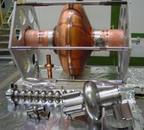About SRF
Brief introduction

SRF cavities are made of different materials, in all shapes and sizes.
Superconducting Radio Frequency (SRF) science and technology deals with the application of superconducting materials to radio frequency (RF) devices. It is well known that many materials, known as superconductors, lose all DC electrical resistance when the temperature drops below the critical temperature
Tc . Unlike DC resistance, the RF surface resistivity is zero only at
T = 0 K (absolute zero). At temperatures above absolute zero, but below the critical temperature, the surface resistivity is greatly reduced, yet non-zero. The ultra-low resistivity of the superconductor yields RF resonators with extremely high quality factors
Q , typically higher than 10
10at frequencies of the order of 1 GHz and temperatures below 2 K. Such a very high
Q resonator and its narrow bandwidth can then be exploited for a variety of applications. RF superconductivity has become an important technology for contemporary particle accelerators, by far its largest application.
Textbooks and Brochures
Hasan Padamsee RF Superconductivity 2010
Hasan Padamsee RF Superconductivity Companion 2010
Hasan Padamsee RF Superconductivity: Volume II: Science, Technology and Applications. 978-3527405725
Hasan Padamsee, Jens Knobloch, Tom Hays RF Superconductivity for Accelerators 978-3527408429
RF Superconductivity - 2004 brochure (PDF, 10.6 MB), prepared by
Hasan Padamsee , is aimed to
summarize the status of the science, technology and applications of superconducting RF (SRF), and to discuss exciting prospects for the future.
Websites
Superconducting RF Cavities: A Primer by
J. Graber from
SRF at Cornell website.
Superconducting Radio Frequency from
Wikipedia .
Courses and Tutorials
United States Particle Accelerator School (USPAS) and
CERN Accelerator School (CAS) offer cources on RF superconductivity. Some course materials are available online:
Starting in 2003,
International Workshops (now Conferences) on RF Superconductivity offer tutorials, which may be found in the online workshop proceedings:
Links


